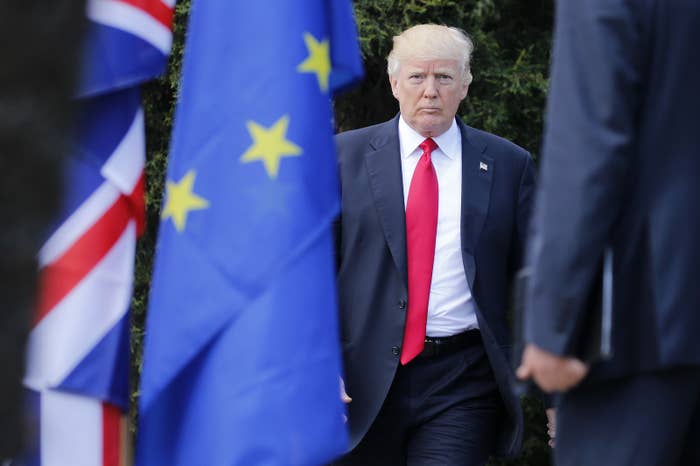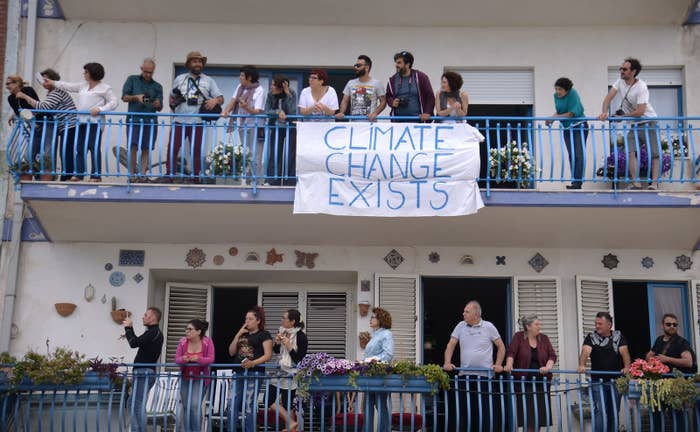
LONDON — The Trump administration is blocking all references to climate change, sexual and reproductive rights, and universal health coverage, in the conclusions of a G7 meeting of health ministers taking place in Milan on Sunday and Monday, BuzzFeed News has learned.
As the health ministries of the world’s seven most advanced economies prepared to meet in Italy, US negotiators spent the past week steadfastly blocking all attempts to reach a compromise on the three issues, sources with knowledge of the negotiations’ progress told BuzzFeed News.
The sources spoke on condition of anonymity because they were not authorized to talk about the negotiations.
The seven countries are negotiating over a draft communique document — the contents of which has been shared with BuzzFeed News — that is due to be agreed on Monday. It notes US demands to strike out all reference to “climate change” and “man-made” weather, and “other disasters.”
The US is also refusing a reference “to engage in international cooperation to implement the Paris climate agreement.”
To the frustration of negotiators from the other six governments — the UK, Germany, Italy, France, Japan, and Canada — as well as the European Union, the US has made its demands late in the day and has set them as red lines.
“As with the rest of the G7 process, the US didn’t engage for months. And, now, just this week, they have erected a wall and came back with extreme positions,” a European negotiator told BuzzFeed News.
The official said the US was taking this approach to block firm recognition of the link between climate change and health-related issues — a theme, the diplomat added, that “has been core to the G7 programme since it launched at the beginning of the year.”
The official added: “All this should have already been part of Taormina [where the G7 leaders met in May] but nobody wanted to upset Trump because he was new. So the decision was taken to postpone this topic to the ministerial meeting that begins today.”
The US Department for Health and Human Services did not respond to request for comment.
In two of the most contested passages of the negotiations, the US has asked to exclude a line that would affirm that “more frequent and intense extreme weather events are straining essential services and health systems” and to remove a distinction between internal and external migration for a more generic “international” migration.
US negotiators have told their colleagues that a number of their recommendations are aimed at streamlining the document.
However, a second official from another European country told BuzzFeed News that “simplification” was “often used as an excuse to remove important details. This is as much about weakening the link between climate change and migration,” the official said, pointing to the fact the US was arguing against having migration as a separate heading in the document.
A second red line the Trump administration has drawn is part of discussions around health care for women and children. The US is against defining sexual and reproductive health as a right, arguing that “in no case should abortion be promoted as a method of family planning or sexual and reproductive health care.”

US negotiators have also asked to not make reference to sexuality education, arguing for the need to “strengthen stable support systems and families” instead. US proposals include a paragraph that, if agreed, would say: “We will help promote programs and educational tools proven to help young people prepare for stable, caring relationships and futures that include healthy, consensual sexual behaviors, free of disease and exploitation, and safe for future childbearing and parenting.”
The US has also slid back on previous agreements regarding gender equality, asking that they be referred to as “commitments” instead.
Meanwhile, in the conclusions of the document, the US has asked to strike out any commitment “to ensure that Universal Health Coverage is achieved in timely fashion by all countries” in favour of a much watered-down reference to efforts “to achieve their goals of increasing access to health care.”
Diplomats have been left frustrated by the US intransigence and as what some perceive as an underlying sense of wanting to undermine multilateral processes.
“The Americans have so far refused even alternative wording not too dissimilar to their proposals, and they still say no. It almost seems that their ‘real goal’ is to block agreement on any conclusions. Everyone is irritated,” a diplomat told BuzzFeed News.
Negotiators from the seven governments are expected to work overnight into Monday in the hope of reaching a compromise.
“The best case scenario is a ‘6+1’ conclusion that highlights that the US is still reviewing its position on a number of issues,” the diplomat said.
A similar format was agreed at the G7 in Taormina where all leaders except Trump reaffirmed their commitment to the Paris climate deal.
However, the “6+1” format would still require consensus among all seven countries.
Failure to reach such a consensus would produce what is called a “Chair’s summary” of the meeting, a format that allows the host to summarise their view of the proceedings. It wouldn’t be the first time this outcome was taken since Trump took office. A meeting in April between energy ministers in Rome ended without a consensus, as did an OECD ministerial meeting in June, to the bafflement of European diplomats.
“The question then is whether the chair will decide to call out the US and put the disagreements out in the open,” the diplomat said.

